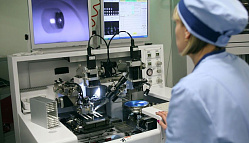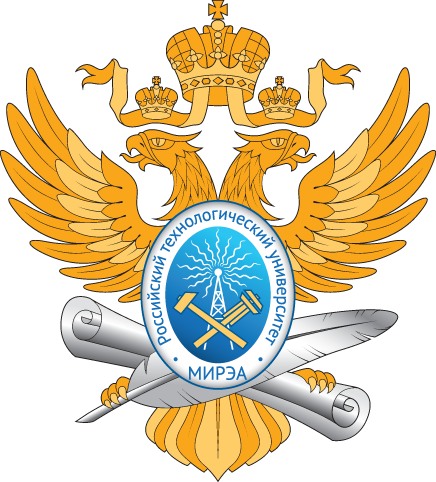12.04.04 Biotechnical systems and technologies

The program gives students theoretical knowledge and practical skills in the development, operation, and service maintenance of biomedical equipment, biotechnical systems and technologies relating to the monitoring and management of living systems and maintenance of people’s working conditions.
Level of education:
Master’s degree
Form of training:
Full-time (daytime)
Venue of training:
Moscow
Entrance exams:
— Higher mathematics
Programs, specializations:
Bioinformation technologies and systems

Students of this Master’s program receive instruction in:
- guidance/control processes in living organisms at various levels (molecular, cellular, etc.)
- physiological data collection and analysis methods, organization and management techniques in physiology
- mathematical simulation and analysis methods for biological processes and systems
- means of control and controlling structures in the brain and the nervous system
- means and tools of pathological process control
- medical data collection and analysis methods for diagnosis and treatment
- biotechnical system nodes and components
- guidance/control processes in living organisms at various levels (molecular, cellular, etc.)
- physiological data collection and analysis methods, organization and management techniques in physiology
- mathematical simulation and analysis methods for biological processes and systems
- means of control and controlling structures in the brain and the nervous system
- means and tools of pathological process control
- medical data collection and analysis methods for diagnosis and treatment
- biotechnical system nodes and components
Alumni can be employed as
- design engineer, development engineer, process engineer
- service engineer, technical documentation specialist
- product manager, direction coordinator
- researcher
Program subjects
- Mathematical simulation of biological processes and systems
- Biotechnical systems and technologies
- Mathematical methods of medical and biological data processing
- Research organization and implementation
- Data processing and presentation systems
- Biotech computer-aided design systems
- Methods of programming medical devices and systems
- Medical systems design
- Information technology in biotechnical systems
- Present-day biomedical engineering issues
- Biomedical imaging techniques
- Optical technology in biomedical applications
- Biosensors
- Analytical technologies and techniques in laboratory diagnostics
- Medical device circulation
- Biomedical technology research and testing methods
- Fundamentals of medical ethics and deontology
- Fundamentals of healthcare legislation
Biocybernetic Systems and Technologies Department
Radiophysical and radiological medical systems and technologies
Students of this Master’s program receive instruction in:
- physical principles of the impact of ionizing and non-ionizing radiation on vital processes at different levels of living matter organization (molecular, cellular, etc.)
- physiological data collection and analysis methods, organization and management techniques in physiology
- mathematical simulation and analysis methods for biological processes and systems
- methods and tools of dosimetry and ionizing radiation safety
- physical foundations and technology of radiation therapy
- uses of computer tomography in diagnostics and therapy
- methods and tools of pathological process control
- physical principles of the impact of ionizing and non-ionizing radiation on vital processes at different levels of living matter organization (molecular, cellular, etc.)
- physiological data collection and analysis methods, organization and management techniques in physiology
- mathematical simulation and analysis methods for biological processes and systems
- methods and tools of dosimetry and ionizing radiation safety
- physical foundations and technology of radiation therapy
- uses of computer tomography in diagnostics and therapy
- methods and tools of pathological process control
Alumni can be employed as
- medical physicist
- chief of an operation and maintenance unit at a medical institution
- medical equipment development engineer
- medical equipment maintenance engineer
- medical equipment repair engineer
- medical equipment adjustment and testing engineer
Program subjects
- Mathematical simulation of biological processes and systems
- Research organization and implementation
- Analytical technologies and hardware in laboratory diagnostics
- Medical system design
- Circulation of medical devices
- Methods and tools of digital signal processing
- Physical and technological foundations of radiation therapy
- Methods and tools of nuclear medicine and radiotherapy
- Human radiation pathology
- Oncology
- Physiotherapy
- Medical and physical fundamentals of computer tomography
- Fundamentals of medical ethics and deontology
- Fundamentals of healthcare legislation
- Clinical dosimetry and radiation safety in medical radiology
- Safety of medical devices
Biocybernetic Systems and Technologies Department
- Educational Activity
-
Institutes
- Institute of Information Technologies
-
Institute of Artificial Intelligence
- About the Institute
- Institute Administration
- History of the Institute
-
Training programs
- Bachelor's Degree Programs
-
Master's Degree Programs
- 01.04.02 Applied mathematics and information science
- 09.04.01. Informatics and computer engineering
- 12.04.04 Biotechnical systems and technologies
- 15.04.04 Automation of technological processes and production
- 15.04.06 Mechatronics and robotics
- 27.04.03 System analysis and management
- 27.04.04 Engineering system control
- Infrastructure
- Alumni
- Contacts
- Institute of Radio Electronics and Informatics
-
Institute for Advanced Technologies and Industrial Programming
- About the Institute
- Institute Administration
- History of the Institute
-
Training programs
-
Bachelor's Degree Programs
- 09.03.02 Information systems and technologies
- 11.03.04 Electronics and nanoelectronics
- 12.03.05 Laser technology and laser techniques
- 15.03.01 Mechanical engineering
- 22.03.01 Materials science and technology
- 27.03.01 Standardization and metrology
- 28.03.01 Nanotechnology and microsystems engineering
- 29.03.04 Decorative material working techniques
- 54.03.01 Graphic design
-
Master's Degree Programs
- 09.04.02. Information systems and technologies
- 11.04.04 Electronics and nanoelectronics
- 12.04.02 Optical engineering
- 15.04.01 Mechanical engineering
- 22.04.01 Materials science and technology
- 27.04.01 Standardization and metrology
- 29.04.04 Decorative material working techniques
- 54.04.01 Graphic design
-
Bachelor's Degree Programs
- Infrastructure
- Alumni
- Contacts
- Institute for Cybersecurity and Digital Technologies
- Lomonosov Institute of Fine Chemical Technologies
- Institute of International Education
- Institute of Management Technologies
-
Mega-Laboratories
- Industry 4.0: Digital Robotized Production center
- Laboratory of Intelligent Autonomous and Multi-Agent Robotic Systems
- Laboratory of Analytic, Modeling, Design and Digital Prototyping Technologies
- Motion Capture Laboratory
- Center of Innovative Technologies in Microelectronics
- Catalytic and Mass Exchange Processes center
- Cell Technologies Megalaboratory operating on the basis of the Department of Chemistry and Technology of Biologically Active Compounds, Medical and Organic Chemistry named after N.A. Preobrazhensky
- Center for Cybersports Robotics
- Elastomers. Thermoplastics. Technologies Educational and Research Center operating on the basis of the Department of Chemistry and Technology of Elastomer Processing named after F.F. Koshelev
- Immersive Technologies Laboratory
- Import Substitution of Information Technologies Educational and scientific testing complex
- Laboratory for the Development and Transfer of Microfluidic Technologies (DTMT)
- Mobile Robotics University Laboratory
- Rare and Precious Metals Research and Technological Center operating on the basis of the Department of Chemistry and Technology of Rare Elements named after K.A. Bolshakov
- Research and Educational Center for Biosynthesis, Isolation and Purification of Monoclonal Antibodies (Generium)
- Smart Production Systems Educational and Scientific Center
- Techno-coworking
- Technocoworking
- Radio electronic Technologies Megalaboratory
- Situation center
- Scientific and Educational Center for Medical Radiology and Dosimetry
- Educational and Research Center for Space Monitoring ("CosMoCenter")
- Laboratory of Geographic Information Systems and Technologies
- Bachelor's Degree Programs
- Master's Degree Programs
- Additional Education Programs
- Physical Education and Sports
© 2024 MIREA - Russian Technological University
